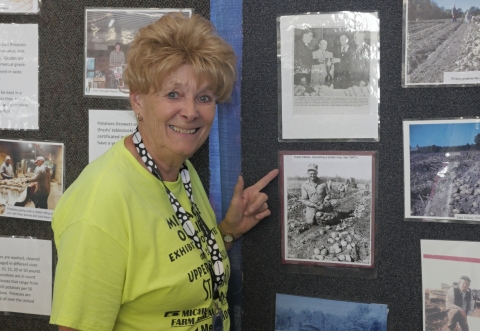
The annual UP State Fair concluded in Escanaba on Sunday, Aug. 17. It was another successful weeklong run for an event that draws upward of 100,000 visitors each year. As always, seed potato farmer Diane Hanson led the charge in showcasing the Upper Peninsula farming community’s past, present, and future to the masses.
Hanson has become the unofficial curator of all things UP farming over the years by collecting photos, news articles, and whatever knickknacks she might get her hands on, which she uses to create a large display in the Miracle Life Pavilion at the fairgrounds each year.
While potatoes are the most prominently grown specialty crop in the Upper Peninsula, beef and dairy are very big industries and are part of Hanson’s showcase. This year, Hanson and a large team of volunteers from all over the UP handed out Michigan potato chips, Escanaba-based Sayklly's Candy, milk, ice cream, and educational materials to adults and children to help bridge the gap between the farming community and the population at-large.
Although the UP doesn’t have near the urban density of metro Detroit or other southern Michigan cities, Hanson still feels a growing disconnect with those who aren’t directly involved with agriculture.
“There’s this old idea of a farmer standing there with a pitchfork, and that’s not what farming is today,” Hanson said. “Young farmers are just like other young people. They go to college, dress the same way, volunteer, and do all those things that everyone does.”
That’s why this year’s farming history display also included a whole section featuring young members of the UP agricultural community. Each featured person had a picture on display with a bio that included what they farm, their plans for the future, and hobbies they enjoy.
“It’s a good way to show they’re just like everybody else,” Hanson said.
Diane Hanson and her husband, Dennis Hanson, ran Hanson Seed Farm for decades. They’re now semi-retired, with sons Scott and Ted Hanson in charge of the operation. Diane grew up around potatoes, as her father, Frank Falkeis, ran the farm when she a youth. The farm had the Falkeis name in its title prior to being changed to Hanson after Dennis and Diane took over. Frank Falkeis was known as the “Spud King” due to his propensity to produce high yields and win best-in-show contests at the fair.
“He stopped entering once my brother and I became old enough to enter our own in 4H,” Diane Hanson said. She added that her father’s willingness to get out in the community and being involved in organizations set an example for her that’s been easy to follow.
“It’s just part of what you do,” she said.
In addition to pictures and news articles Diane has collected over the years and showcases at the fair, she’s also created numerous signs that tell the story of potatoes, including how they’re grown, sorted, and all sorts of nutritional and food safety information. She works hard year-round to continue to collect historical information and visuals for UP farms, whether potato or otherwise, a task that she admits has gotten easier because of Facebook. Diane has also spent a fair share of time going through old newspaper microfilms to get information, names, and dates for her collection.
About 2,400 acres of potatoes are planted in the UP each year. That includes 1,400 of seed potatoes and 1,000 of tablestock. Seed potatoes are especially popular in the UP, partly because the cooler climate helps limit disease and insect pressure, a key in keeping a clean potato supply line.
Photo caption: Diane Hanson stands next to a photo of her father, Frank Falkeis, who died in 1997. See our Facebook page for more photos.
FROM WLUC TV6: Cornell farmer says seed potato future looks bright
